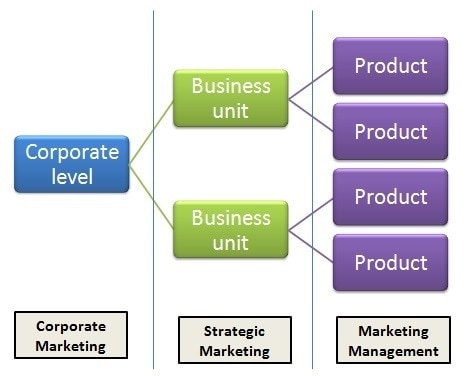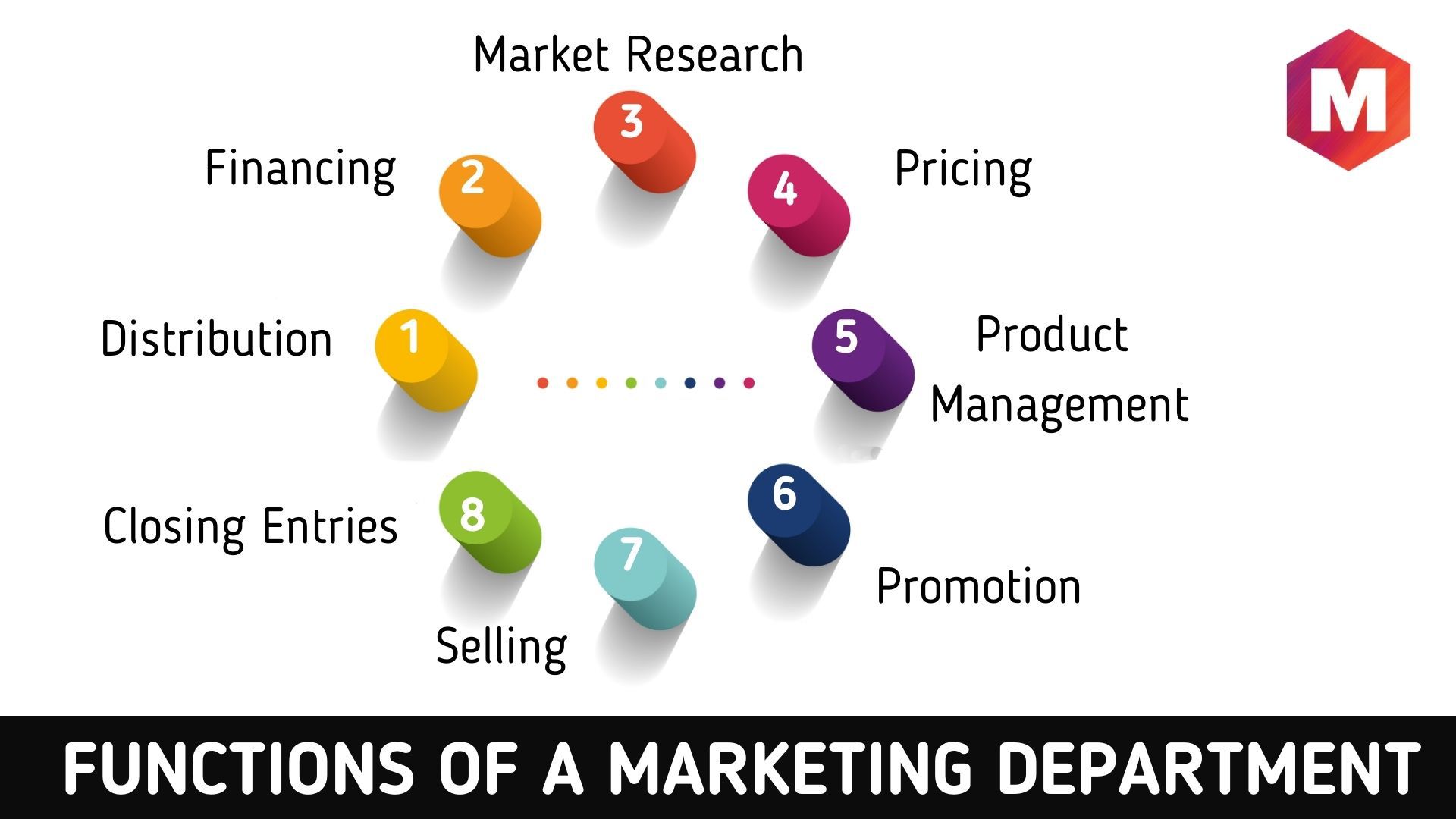The role of marketing is associated with the responsibilities and functions that the marketing department is supposed to manage to optimize the presence, lead generation, market demand, and sales of an organization or brand.
The marketing department may comprise marketing researchers, sales representatives, advertising managers, pricing specialists, customer service representatives, and product managers.
Table of Contents
What is Marketing?
Talking about marketing, it is a mix of efforts that the marketing department undertakes to create, communicate, deliver, and exchange valuable offerings. It is concerned solely with generating value for the clients, customers, society, and organization partners.
The objective of it all is to identify and satisfy the customers to retain them. “Customer is the king” is the maxim that everyone in the marketing department has to live by.
For large organizations, marketing is a visible component and holds a considerable share of expenditure. However, in organizations that operate in a regulated environment, marketing may not play a central role.
What is the Role of Marketing?
There is a separate department in an organization, the marketing department, that is concerned with marketing. The department is further responsible for creating the right reporting relationships and ensuring that the organization has adequate resources.
Marketing involves a complete spectrum of functions, ranging from low to high. The main focus should be on getting more insights into the customers’ needs to be served well.
Purpose of a Marketing Strategy
Marketing involves taking up specific responsibilities. The first thing is to understand the competitive and the economic landscape of the industry in which the organization is functioning.
It is essential to conduct market segmentation, and if need be, micro-segmentation, target the audience with the appropriate marketing strategies. At this point, what comes the most in handy is the market research that has been done so far.
After the products have been developed, it becomes necessary to probe into the customer experience. Along with this, it is ideal for performing a SWOT analysis so that the organization can devise ways to get a competitive edge in the market.
The future is uncertain, but it is not wise to face it without any planning. So, an organization has to create plans and implement them in the best way possible. Lastly, systems should be developed to monitor and manage the progress of the organization.
Different Stages that decide the Role of Marketing Campaigns
The concept of customer lifetime value comes into the picture when building a strong customer bond through a marketing campaign. It is about calculating how much gain an organization can make from its customers.
Organizations are likely to have customers on a low-high continuum of customer lifetime value. Effective marketing practices can help them move many of their customers to the high end of this continuum.
When it is traditional, social media, or digital marketing activities, businesses have to go through these three stages while expanding their reach into the target markets to successfully implement the marketing roles.
The following stages of customer relationship should be incorporated in a marketing campaign-
Stage 1 – Identify your target customers
- At this stage, an organization should define its target audience. All those whose customer lifetime value is high should be a part of the target market.
- The next step is to understand and learn what the wants of the customers are.
- The organization is then supposed to drive awareness of its products and services so that there is some demand growth.
- This can help in getting new business.
Stage 2 – Ensuring customer satisfaction
- At this stage, an organization should keep on measuring its customers’ satisfaction with its products.
- It should track and monitor how the needs or wants of its customers are changing over time.
- With so much information at hand, it can effectively improve its goodwill. This will, in turn, help in building brand trust and customer confidence.
- As a result, the organization will be able to put up a strong fight against its competitors.
Stage 3 – Retain your customers
- An organization should try to bring most of its customer database under the list of loyal customers.
- It should be quick to adapt to the changing needs of its customers.
After understanding the three stages of marketing, let us now have a look at the 10 roles that these stages might lead to-
10 Role of Marketing Strategy
1. Identifying and meeting needs and wants of target markets
Marketers need to find out the needs of the target audience and accordingly, they should tweak their marketing strategies to run a personalized marketing strategy.
2. Widening the reach and market
Businesses use different marketing efforts like PR, advertising, promotion, sales, event marketing, etc for widening the reach of a brand, product, or service in the target markets.
3. Optimizing survival, growth, and reputation of the company
Marketing plays a key role in ensuring customer retention and increasing the market share for a brand in a way that the brand can have a sustainable and growth-driven market presence.
4. Opting for the right price
Pricing is one of the key components of the marketing mix and marketing strategies should ensure that a product or service is offered in the target market at the right price.
5. Ensuring improved product offerings
A good product should further be adeptly packed and labeled. The marketing department is supposed to design and manage product offerings.
6. Creating utility
The marketing team is also responsible for creating the utility for the product or service. By making strategies concerning time, place, information, form, possession utility, marketing strategies talk about the ability of a product or service in satisfying the needs or wants.
7. Managing varied levels of demand
The role of marketing is associated with managing different levels of demand such as latent demand, negative demand, declining demand, no demand, latent demand, full demand, irregular demand, or overfull demand.
8. Facing competition
The marketing department is responsible for making and implementing strategies as per the analysis of competitors’ offerings while fulfilling consumers’ needs and wants.
9. Handling social responsibilities
Marketing campaigns like social marketing and cause-related marketing are integral parts of contemporary marketing roles that fulfill social responsibility and channel awareness about key social issues or causes.
10. Channelizing economic growth
Marketing campaigns are powerful in creating demand and then channelizing production and distribution activities in response to the created demands. Hence, marketing plays a crucial role in ensuring economic growth.
Importance of Marketing Efforts for a Product or Service
Marketing is key to the success of any organization. Every organization needs to create value for its customers and ensure that it is marketing itself to convince its prospects.
It is essential to understand the target market and keep track of the needs of the customers. Not doing this can make the organization susceptible to failure.
Selling the product when there isn’t any might be a bit difficult. This makes marketing the central aspect of the equation. Marketing the right way will direct the organization towards the path of growth. This will help it to inch ahead in the competitive environment.
Different marketing approaches that decide the role of marketing campaigns-
1. Production Approach
The production approach or concept in marketing came in the latter 1800s, which was the Industrial Revolution. At that juncture, many companies were indulging in mass production and automation.
The idea was to sell more and more by producing low-cost products at scale. They thought that the customers do not buy the product based on its features but its low cost.
Nowadays, this approach is adopted by organizations looking for mass production, lower cost of production, and efficient processes. Many developing countries also deploy this concept to help the manufacturing sector gain economically.
2. Marketing Approach
The marketing approach or concept is concerned with customer-centricity. The organization needs to place the customer at the center of the stage and glean as much information as possible. This is the prerequisite before an organization goes about marketing its products.
The entire decision-making process should revolve around the information obtained from the customer. It is vital to understand the customer’s needs and then administer value to them based on those needs.
The organizations will outperform their competitors when they learn, design, communicate, deliver, and exchange valuable information to their prospects.
3. Product Approach
At present, many companies have adopted the product approach or concept of marketing. Instead of understanding the customers’ needs, they focus on highlighting the product features and lower prices.
It is believed that the organization is likely to sell more by producing a technically advanced product or cheap. It has been used by many successful organizations in the past and is still very prevalent.
This is the sort of approach that can prove lucrative, but the companies following it are more prone to losing out to those following the marketing approach.
4. Sales Approach
The sales approach is for those companies that attach a lot of importance to the process of sales. Their goal is to ensure that whatever they produce gets sold in the market, regardless of the customer’s needs.
This concept is dear to many B2B companies as they have a proper department for conducting sales, which comprises experts in the subject matter. Such a department is potential enough to sell anything to anyone.
Aggressive selling techniques, promotions, and all the other methods that help sell the products are included.
7 Functions of a Marketing Department
1. Distribution
An organization has to focus on distributing or delivering whatever it is producing to its customers. It has to select a distribution channel that would be right for its product.
Most businesses are set up in some urban land to quickly sell their products through the appropriate distribution channel. Even if they want to trade with the rural folks, they need to develop a proper distribution strategy.
2. Financing
Financing is an important aspect when it comes to designing a marketing campaign. If an organization wants its marketing campaign to succeed, it should allocate a considerable amount of funds.
3. Market Research
An organization needs to research the audience thoroughly it is planning to target. Using the right marketing tools to identify the demographic depending on your product is a great way to start.
4. Pricing
The market research that the organization performed early will help it to price its products. It is important to note that the price point should neither be set too low nor too high.
5. Product Management
No organization can survive without managing its products. So, it must continuously review the products and make whatever tweaks are required.
6. Promotion
An organization needs to advertise the right products at the right kind of place and to the right market. It is practical to create advertising strategies around the recent trends.
7. Selling
Selling is the step that starts with researching the target market to understand the needs of the customers. This is the process that builds the basis of marketing.
How is Marketing Different from Sales?
Many organizations often conflate marketing with sales, whereas, in reality, these are two different concepts. The only way to truly understand their difference is to look at the traditional approaches that went into defining them.
Marketing is a broader term and encompasses a great many functions. Firstly, the organization has to analyze the marketplace in which the business is set up in this process. It has to identify its rivals so that it can strategize efficiently.
Moreover, marketing is concerned with defining the current market position of the firm and appropriately pricing its products. Lastly, efforts have to be made to promote the organization to the target demographic by highlighting its benefits.
On the other hand, the sales process is more or less concerned with identifying the customers and encouraging the interested ones to purchase the product.
Role of Customer Relationships in a Marketing Strategy
Everything in marketing points back to the question, ‘What value it has for the customer?’
This is why marketing serves no helpful purpose if customers are not considered the linchpin. The organization, reaching out to the customers, has to understand them well.
In the contemporary world, it is common to come across the term ‘customer relationship management.’ This term harks back to the overall objective of marketing: to identify and satisfy the customers so that they can be retained.
Customer relationship management should take up a substantial role in the marketing strategy of the organizations. It is part of the marketing concept discussed above. With the advancements in technology, it has become relatively easy to stay in touch with customers.
Many organizations realize the importance of connecting with their customers for building long-lasting relationships. The data obtained from the customers about their needs can be leveraged to a great extent, which can help to steer things in favor of the organization.
There are several platforms where organizations can network and communicate with their customers. This helps them in creating and managing customer relationships effectively.
Conclusion!
A successful marketing strategy not only widens the brand reach, or generates leads, or boosts sales but also creates demands in the target markets to pave the new path of success and growth.
On the concluding note, it is clear that in companies, the marketing department plays the most crucial role around which the whole organization progresses.
What role of marketing do you find most crucial for your brand?
Liked this post? Check out the complete series on Marketing



it is nice